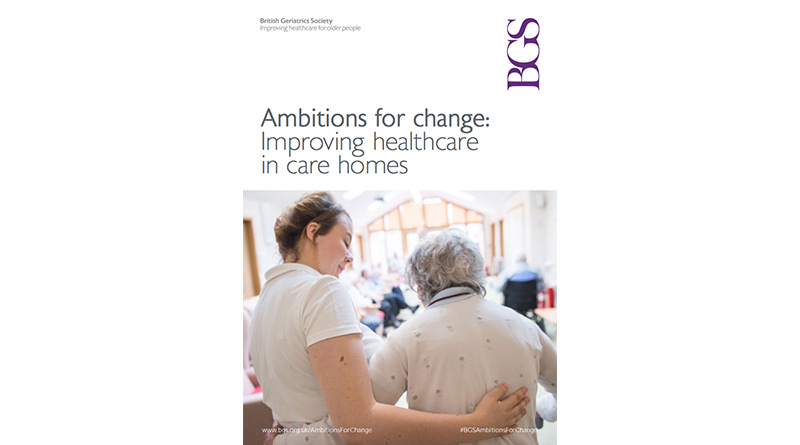‘Ambitions For Change’ – Report On Improving Healthcare In Care Homes Launched
The British Geriatrics Society HAS published a new report aimed at improving the quality of healthcare for care home residents. The COVID-19 pandemic has had a devastating impact on older people, with 35.6% of the 130,000 deaths in the UK occurring in people living in care homes. Many others suffered from worsening physical, mental and emotional health as a result of lockdowns and visiting restrictions. This new report sets out how care home staff and visiting healthcare professionals can work together to ensure high-quality healthcare is delivered for the more than 400,000 older people who live in care homes.
The report, Ambitions for change: Improving healthcare in care homes, describes how healthcare is currently provided in these diverse settings, which range from small privately-owned care homes to large purpose-built homes run by care home chains. The COVID pandemic created extraordinary challenges for care homes, and this report argues that government, commissioners, care home providers and other stakeholders must now ensure that the structures, support and skills are consistently in place to ensure care home residents have access to the same standard of healthcare as other citizens.
Most residents of care homes live with frailty and have complex care needs. Following on from BGS guidance produced at the start of the pandemic, this report sets out common health concerns experienced by older people living in care homes, advocating for treatment on site whenever possible, to avoid the potential harms of hospitalisation. The delivery of person-centred, compassionate care is paramount, recognising that many care home residents are in the last two years of life. The report recommends the systematic use of Comprehensive Geriatric Assessment to ensure personalised individual care.
A care home is not a temporary residence and nor is it a hospital. It is the place that its residents call home. Recent developments have enabled more hospital-style care to be delivered in people’s homes, and the report encourages further development of this model. It makes recommendations to enable the delivery of healthcare in care homes which include the skills needed by both care home staff and visiting primary care teams, the use of digital communication and the sharing of data across healthcare providers. The recommendations can be implemented across the four nations of the UK, despite their different arrangements for funding and delivering social care.
The BGS believes older people’s experience of healthcare in care homes can be significantly enhanced by the adoption of these recommendations. After the traumatic period of the COVID pandemic, the report argues that now is the time to put in place improvements to how healthcare is delivered, to enable care home residents to live well for longer.
Professor Adam Gordon, BGS President Elect and principal author of the report said:
As we pass what we hope is the worst of the COVID-19 pandemic, it is right that we turn our attention to the group that were most neglected at the beginning of the crisis – care home residents. During the pandemic, the British Geriatrics Society provided guidance on delivering treatment for COVID to older people living in care homes, and now we are building on that with this document about the delivery of other healthcare services in this setting. We sincerely hope that colleagues working in care homes find this useful, and we look forward to continuing to work with them to ensure that all older people have access to the most appropriate care for them in the right place at the right time.”
Anita Astle MBE, Managing Director of Wren Hall Nursing Home, said:
The BGS guidance published during the pandemic was incredibly useful for care home staff caring for older people with complex needs at an extremely challenging time. As we move towards providing more healthcare in care homes and avoiding unnecessary hospital admissions, this new document from the BGS provides lots of helpful advice. It also makes recommendations to governments in ensuring that older people can receive high quality healthcare in their care home and that care home staff are supported to provide this care.”






